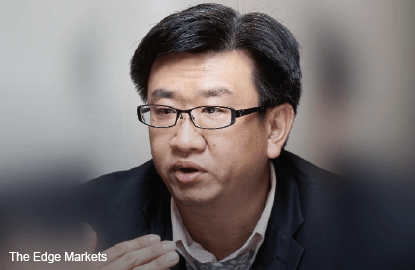
This article first appeared in Corporate, The Edge Malaysia Weekly, on May 23 - 29, 2016.
SINCE the announcement of an asset injection last September, Instacom Group Bhd, now known as Vivocom International Holdings Bhd, has attracted no small amount of attention on multiple fronts. The company received fairly extensive media coverage as its share price surged 176.9% to close at 36 sen on May 12 while its market capitalisation expanded at a faster rate of 608.2% to RM931.4 million from a year ago.
On May 12, Vivocom reported a 22-fold jump in net profit to RM19.9 million in its first quarter ended March 31, 2106 (1QFY2016), largely due to new revenue contributions from aluminium manufacturing and construction. However, a rally in its shares that started in mid-February seems to have reached an anticlimax — the counter fell 12.5% to 32 sen from an all-time high of 36 sen since the release of its financial results for 1QFY2016.
So, why did Vivocom’s shares decline despite the good news? One trader says the fall has more to do with trading psychology than the 1Q earnings not meeting investors’ expectations. He explains that although Vivocom has a very “powerful and potent story”, its penny stock status makes it easier for speculators to go in for an easy kill. Punters probably quickly built up their positions upon hearing rumours that the results would be fantastic, and took profit once the results came out.
“If you look at what they have done to their share base through various corporate exercises, the direction is somewhat speculative. Although the company’s market capitalisation is more than RM800 million, its share price is only 32 sen due to the unusually large share base that makes it a top volume stock. They have come to the equity market to raise funds and it looks like they will need to raise a lot more capital, thereby diluting the earnings of existing shareholders — we will never know when the share placement stops,” says a fund manager.
“Although the stock appears cheap based on a FY2017 PER of a mere six times and the company has a good Chinese FDI story due to its connections with China Railway Construction Corp Ltd (CRCC), its execution risk and cash flow issues are real. As we have seen in the past, there were companies with nice stories that just failed to execute and deliver. Unlike established big players like Gamuda, IJM Corp or SunCon, Vivocom has a relatively short track record, so the big discount in valuation probably reflects the level of risks,” he adds.
However, CIMB Research analyst Marcus Chan disagrees that Vivocom is a speculative stock. “The recent drop in its share price has little to do with the company’s fundamentals. As one of the top 10 most active stocks, it’s a reflection of the change in retail sentiment, which is affected by MSCI’s weightage rebalancing that unfortunately coincided with Vivocom’s earnings release. So, I’m not too worried. In fact, the price weakness provides institutional investors with a good entry point into its shares.”
Interestingly, off-market transactions compiled by Bloomberg show that 7.8 million Vivocom shares worth RM2.5 million were transacted in block trades from May 17 to 19, which are typically executed by institutional investors. This works out to an average transaction price of 32 sen per share, close to its open market prices of 32-33 sen on these three days.
When asked whether Vivocom faces a perception issue inherited from Instacom, Chan says it is now a totally different animal compared with Instacom as the management and shareholders have changed. He adds that the new team has delivered in terms of financial performance in the past five to six months.
“As for cash flow concerns, as we win more jobs we definitely need more working capital to fund these projects. As a rule of thumb, we need RM10 million in working capital for every RM100 million job. Since our outstanding order book has expanded to RM1 billion and other contracts are being finalised in the coming months, we will need more funding, people and resources to execute the jobs and help us grow,” explains executive director Choo Seng Choon.
“If we go to banks for borrowings, we need to pay a high 7% to 8% interest rate, an expense that would eat into our profits. But if we are able to grow our earnings by 200%, a 10% dilution in earnings is not that significant an impact. Additionally, we welcome institutional investors to be our long-term shareholders to balance out our large retail investor base,” he says.
According to Bloomberg data, mutual fund filings show that institutional investors held an aggregate 3.6% equity interest in the company as at March 31. Vivocom is eyeing a transfer to Bursa Malaysia’s Main Market by the middle of next year, after meeting the profit requirement in FY2016 and having the financial year’s accounts audited.
In a May 12 note to clients, CIMB Research says the strong 1Q results should allay investor concerns about Vivocom’s execution ability. It raised its target price for the stock to 78 sen from 67 sen. Meanwhile, MIDF Research, in a recent note, reiterates its positive stance on the construction sector with Vivocom as one of its top picks.
Maybank IB Research notes that brokers are generally bullish on the stock as the street is forecasting a three-year 153% EPS CAGR for FY2015 to FY2018 against the backdrop of a strong job pipeline. The research house opines that a key parameter to monitor is the value of new job wins, which is crucial to confirm the bullish expectations of the stock.
Save by subscribing to us for your print and/or digital copy.
P/S: The Edge is also available on Apple's AppStore and Androids' Google Play.